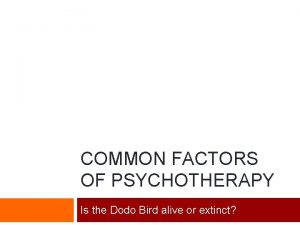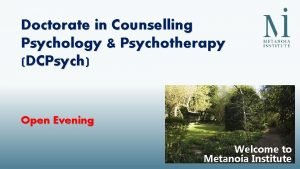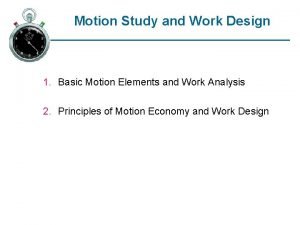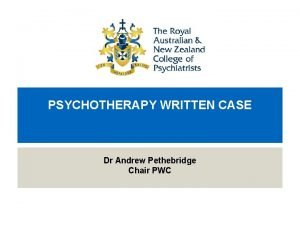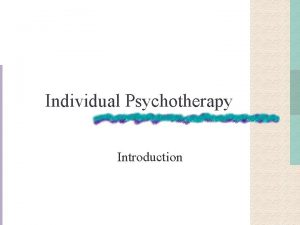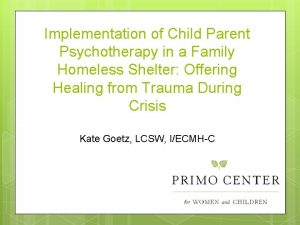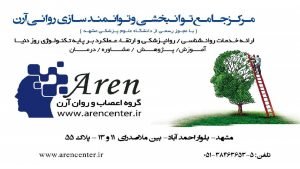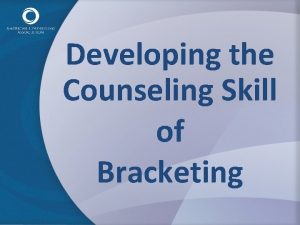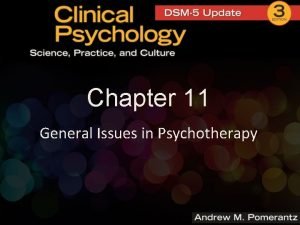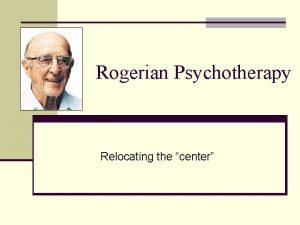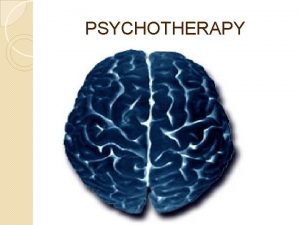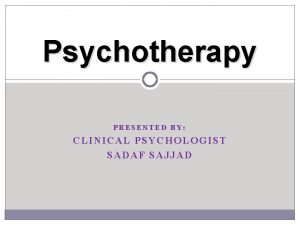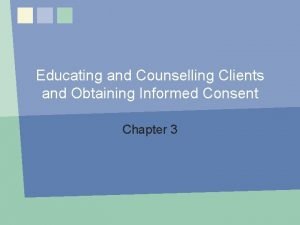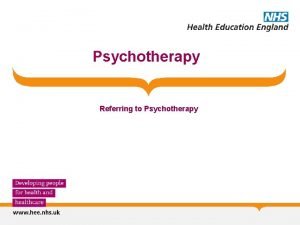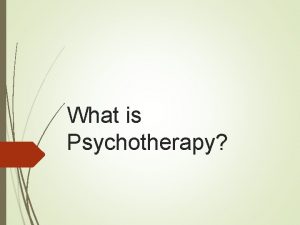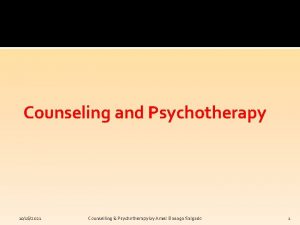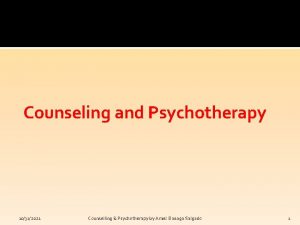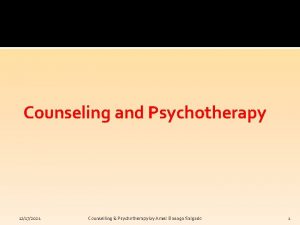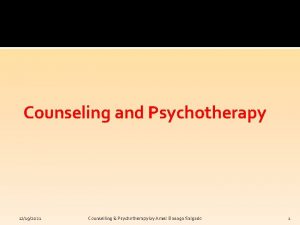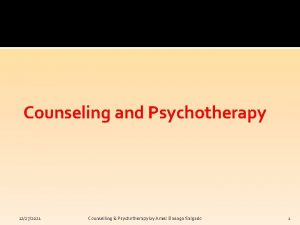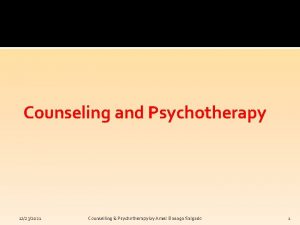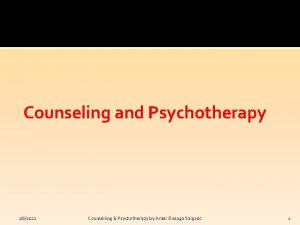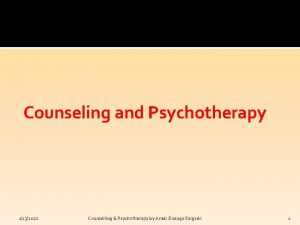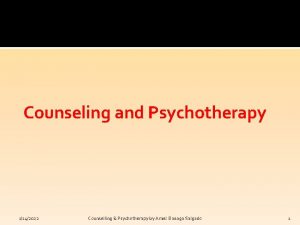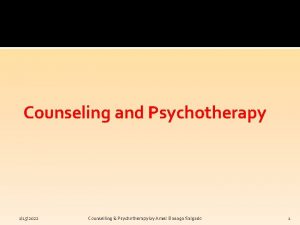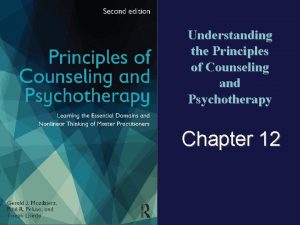Understanding the Principles of Counseling and Psychotherapy Chapter
















- Slides: 16

Understanding the Principles of Counseling and Psychotherapy Chapter 1

Chapter 1 Overview The Problem of the Sorcerer’s Apprentice Current State of Psychotherapy Proposed Solutions and Their Limitations Learning from the Experts The Purpose of this Book. Learning to Think Like a Therapist

The Current State of Psychotherapy 1. Therapy is effective in helping people with mental disorders, adjustment problems, and relational difficulties in life. Regardless of type of treatment. As effective as medication (over time).

The Current State of Psychotherapy 2. Therapy can be effective quickly and is a cost-effective treatment. 75% of clients improve in first 6 months. Half of all clients show improvement in 8 - 10 sessions

The Current State of Psychotherapy 3. Despite the benefits, it is difficult to get treatment for those who need it, and keeping clients in treatment long enough. 25% of clients with a disorder go untreated. Half of all clients drop out before there is significant improvement 76% of survey participants said they did not have confidence in effectiveness of therapy

The Current State of Psychotherapy 4. Effective therapy is not being provided on a consistent basis. Clients who don’t improve in first 3 sessions likely won’t improve at all. They are TWICE as likely to dropout prematurely. This is because students are taught about techniques and skills alone, NOT what is needed to be effective.

Proposed Solutions: Manualization üeffective therapies must have similar steps üif identified, quantified, and replicated, would produce the same results üregardless of who the client or therapist was MAIN BENEFIT- Allowed for Empirical Validation of Treatments (EVTs).

Proposed Solutions: Manualization Limitationsütoo narrow in scope of clients üover-reliance on treatment manuals can harm clients üappear to take the person of therapist out of the equation

Proposed Solutions: Integration All the common elements put together Regardless of theory Technical Eclecticism Theoretical Integration Common Factors

Proposed Solutions: Integration Limitations- Created 500 new models! Lasting contribution: Common Factors 15% Faith/Hope/Expectancy 15% Interventions/Techniques 40% Client Resources 30% Therapeutic Relationship

Learning from Masters • Master Practitioners seem to be advanced in 3 areas: Cognitive Domain Emotional Domain Relational Domain

Learning from Masters Cognitive Domain –They are voracious learners. –Accumulated experience has become a continually accessed, major resource for them. –They value cognitive complexity and the ambiguity of the human condition.

Learning from Masters Emotional Domain –They appear to have emotional receptivity, defined as being self-aware, reflective, non-defensive, and open to feedback. –They seem to be mentally healthy and mature individuals who attend to their own emotional well-being. –They are aware of how their emotional health affects the quality of their work.

Learning from Masters Relational Domain –They possess strong relationship skills. –They believe that the foundation for therapeutic change is a strong working alliance. –They appear to be experts at using their exceptional relationship skills in therapy.

Putting it together So is it necessary to wait until you have 20 years experience to understand “mastery” We think not! By exposing you NOW to these elements, and de-mystifying the process, we hope to prevent the “Problem of the Sorcerer’s Apprentice!

THANK YOU. Any Questions?
 Guidance and counselling difference
Guidance and counselling difference Dodo bird verdict psychology
Dodo bird verdict psychology Doctorate in counselling and psychotherapy
Doctorate in counselling and psychotherapy Effective therbligs
Effective therbligs Ranzcp psychotherapy written case
Ranzcp psychotherapy written case Psychotherapy ap psychology definition
Psychotherapy ap psychology definition Re-educative individual psychotherapy
Re-educative individual psychotherapy Child parent psychotherapy triangle
Child parent psychotherapy triangle Cognitive psychology ppt
Cognitive psychology ppt Bracketing in counseling
Bracketing in counseling General issues in psychotherapy
General issues in psychotherapy Rogerian psychotherapy
Rogerian psychotherapy Psychotherapy refers to
Psychotherapy refers to Psychotherapy definition psychology
Psychotherapy definition psychology Counselling ppt
Counselling ppt Quantum psychotherapy
Quantum psychotherapy The primary goal of cognitive psychotherapy is
The primary goal of cognitive psychotherapy is

